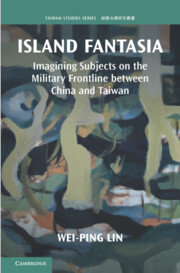Acknowledgements
I first visited Matsu for a conference in 2006. At that time, the islanders were contemplating the varied possibilities for their future, as direct “links” between China and Taiwan would soon be established after years of military confrontation. During that first visit, the islanders’ close-yet-distant feeling for the ocean deeply intrigued me. Since then, and over many years of traveling back and forth between Taiwan and Matsu, I have relied on the help and friendship of many Matsu people. To protect the privacy of my informants, I have used pseudonyms for many in this book, but my gratitude to them for talking to and for teaching me goes beyond anything words can express. Not only have I learned to be patient (while waiting interminably for frequently canceled flights to Matsu), I have also improved at playing “bandit mahjong” (though I will probably never come close to matching their speed). Most importantly, I have always marveled at and aspired to match their imaginative powers. My warmest thanks go to my foster mother, whom I call “laoma,” and to her family for housing, feeding, and standing by me: their love, knowledge, and support has been an emotional anchor during my time spent on these islands.
The fieldwork for this book was funded for several years by the Ministry of Technology, Taiwan, and by National Taiwan University. The Harvard-Yenching Institute and the Chiang Ching-kuo Foundation (CCKF) kindly sponsored the publication of this book, and I completed the manuscript during my time as a visiting scholar at the Harvard-Yenching Institute. Cambridge, MA, provided a stimulating environment in which to think and write, and I would like to express gratitude to all my Harvard-Yenching colleagues, in particular to Li Ruohong, who shared her thoughts with me during my stay.
Michael Szonyi, Li Ren-Yuan, and Lo Shih-Chieh came to visit and travel around the Matsu islands with me. I benefited tremendously from this trip. My thanks especially to Michael for his work on Jinmen, which piqued my interest in doing ethnography in Matsu, as well as for the questions he posed during the trip, which pushed me to think more broadly about the history of the islands.
Earlier versions of some of the book chapters were given at talks, workshops, and panels at Harvard University, Boston University, the University of Michigan at Ann Arbor, Brown University, Xiamen University, Academia Sinica, National Taiwan University, National Chengchi University, and at the annual meetings of the Association for Asian Studies (AAS). Some chapters were subsequently published as journal papers, and are adapted therefrom: Chapter 5 (W. Lin Reference Lin2016, reprinted by permission of the Department of Anthropology, National Taiwan University); Chapter 8 (W. Lin 2013, Reference Lin2017, reprinted by permission of Taishe Press and Taylor & Francis Group); and Chapter 9 (W. Lin 2009, Reference Li2014, reprinted by permission of The Department of Anthropology, National Taiwan University and Cambridge University Press). I would like to thank Elizabeth Perry, Erik Mueggler, James Robson, Rebecca Nedostup, Cheng Weining, Huang Hou-Ming, and Huang Xiangchun for their invitations, and to them and the meeting participants for helpful comments.
Many people have inspired me over the years, in particular Liu Yuan-Ju and Lee Feng-Mao. Robert Graham and the Chatterjee family were always eager sounding boards for my stories and ideas about Matsu. D. J. Hatfield and Huang Ying-Kuei read several chapters in the early stages and made many helpful suggestions. I am most especially grateful to Robert Weller who invited me to numerous workshops and read the whole manuscript in its final stages. His thoughts and comments have been invaluable. I also wish to express my deep appreciation for Cheng I-Yih’s support, in countless ways, during the long process of fieldwork and writing. I am very grateful to her for sharing her wisdom with me.
Many people have helped this book to take shape. My students from Matsu, Wang Chun-Hui and Tsao Yi-Hsun, worked with me and introduced me to their families. I had fruitful discussions with Zhang Guangdong, and I benefited from comments by Shen Yang, Yu Junfeng, En-Ya Tsai, Ning Ge, Peng Handan, Gui Qi, and Hung-Shiuan Yu, who generously contributed their ideas in my class. Peng Jiahong helped to draw maps and figures. Tang Yi-Jie helped with the romanization of the Fuzhou dialect. Eleanor Goodman and Geoffrey Voorhies improved the English of the book. Moreover, I would like to express my special gratitude to the team from Cambridge University Press: to Catherine Smith and Angela Roberts for help with editing, and to Joe Ng for shepherding this book through publication.
My mother and brother have always cared profoundly for my well-being; it is in the minor details of life that they show their love and support. And finally, my greatest thanks to Pinaki; this book would be impossible without his company and his encouragement.



